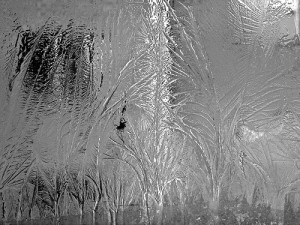Winter is right around the corner. It’s time to crank up the furnace, turn on the fireplace, and throw some extra blankets onto your bed and couch.
Being warm and cozy in the winter is practically a necessity—but staying warm when the thermometer dips can get seriously expensive if your home isn’t energy efficient.
The most infamous culprits of poor energy efficiency are leaky windows and doors. So: what should you look out for on your windows this winter? Let’s have a look:
Humidity: A telltale sign of poorly-insulated windows
Cold air from windows is not the only way to tell that your windows are poorly insulated. Water and even ice forming on the glass can be a red flag.
This is where humidity comes in. Most people would assume that condensation and humidity on a window means a well-heated (i.e. insulated) home. The truth is, however, that condensation on your windows is a sign that cold “air” is actually being transferred into your home, and hot air is being transferred out.
To better understand what we’re talking about, picture a glass of iced tea on a hot summer day. The colder the glass, the more condensation will form on the glass and the faster your ice tea will melt. That is because the heat and humidity from the outside is being transferred onto the glass, causing condensation.
Now take a look at your windows. Most vents are located directly under the window. Hot air always moves to the coldest area in your home. Your furnace will heat up the area around your window before moving into the rest of your home. Poorly insulated windows will be colder, causing your furnace to spend more time heating up that area. Start multiplying that issue times the number of windows in your home and you can see why those energy bills can skyrocket.
And that’s not the end of it. On top of hiking up your energy bill, condensation on wooden windows can wreak havoc on the wood resulting in discoloration, mold, and then rot. In turn, your windows slowly begin to deteriorate and eventually, you’ll need to replace them altogether.
Balancing out the humidity
Humidity plays an important role in your home, but have too much and you’ll feel like you are living in a sauna. (You’ll see lots of moisture on your windows like we mentioned above.) Too little humidity, and you’ll experience discomfort from dry skin, cracked lips, and more.
The key to having a comfortable environment for your home is to keep it at a livable humidity level. If you want to balance that out with mitigating moisture on your windows, you need to make sure your windows are well-insulated.
Windows that are installed with energy-efficient glass will help combat these issues, not only lowering your energy bill but also keeping your windows from rotting. That doesn’t mean you’ll never see condensation on your glass (especially if the humidity level is high, like when you take a shower), but it will at least make it happen much less often.
Don’t get caught having to suffer through the winter with poor insulation. Here at ODW we carry an extensive line of top-quality, energy-efficient windows for you to choose from. We can install windows during the winter, too—there’s no reason to wait for spring. What are you waiting for?
—

